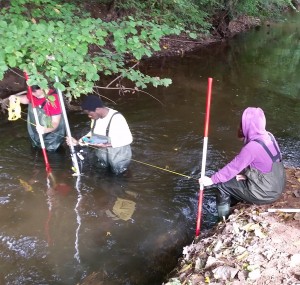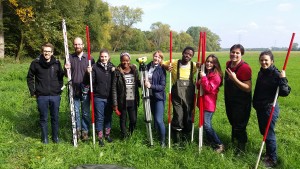Landau and its small river the Queich just belong together. Concerned about the river’s water quality, the masters students of Ecotoxicology investigated the influence of wastewater treatment sewage inlets within the scope of the optional module “Water Analysis Lab Course”.
During the lab course, the combined forces of physics and chemistry were harnessed to reveal potentially harmful anthropogenic effects on the Queichs’ water quality. The municipal wastewater treatment plant in Landau was identified as one major pollution source. Water sampling was conducted at the sewage outlet as well as in the river’s upstream and mixing sections. In the chemistry lab, the students analyzed the water samples in regards to quality parameters such as biological oxygen demand, phenols, ammonium, turbidity and oil and grease content. However, chemical water parameters of a river are difficult to evaluate without knowing the hydrologic and hydraulic boundary conditions. Students therefore additionally measured a variety of physical parameters for a complete riverbed survey amongst other calculations. Applied methods of physical transport processes also included extraterrestrial-looking, floating gas chambers used to detect greenhouse gas emissions.
As an interesting bonus, samples from a paper mill wastewater treatment plant in Annweiler as well as wastewater samples from olive oil production in Israel and Palestine were also analyzed.
Even though the “Water Analysis Lab Course” was only for two weeks, the students gained an intense and many-sided insight in physico-chemical water quality monitoring – which is an important field in Ecotoxicology due to surface water bodies being key ecosystems for aquatic and terrestrial life.


